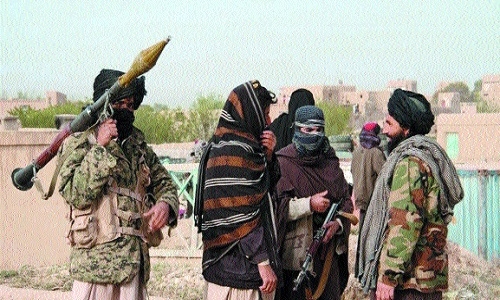Taliban regime in kabul is in deep conflict with new Pak Govt
| Date :11-Jan-2023 |

By Sankar Ray
PAKISTAN - Islamabad camaraderie, built up after the capture of Afghanistan by the Taliban and formation of a new Emirate in Kabul on August 15, 2021, faces a sanguinary breach. A conflictual discontent was simmering ever since the Federal Government had struck a ceasefire with the Tehrik-e Taliban Pakistan during the regime of Pakistan Tehreek-i- Insaf in January 2022 with the then Prime Minister Imran Khan Niazi at the helm. It had burst out in August last year when four TTP top commanders were killed.
Although the killing of TTP commanders happened inside Pakistan, it had struck a major blow to the militant group, and cast doubts on the grim reality against the cease-fire and ongoing peace talks between the TTP and the Pakistani Government. The matter worsened when the TTP retaliated by gunning down six Pakistani police officers immediately thereafter in a vehicle during an ambush in the city of Lakki Marwat, provincial capital of Khyber Pakhtunkhwa. Security establishment in Islamabad took it as one of the deadliest attacks in months.
However, as no group had claimed responsibility for the deadly blast, local political analysts found therein a reflex of an internal rift over the prospect of a lasting truce with the Pakistani rule that the TTP, had been fighting to overthrow for several years.
Islamabad even after the installation of a Federal Government under the coalition of Pakisan Democratic Movement with Mian Shehbaz Sharif of the Pakisan Muslim League (Nawaz) as the PM has been trying to mend fences with the top brass of Emirate in Kabul. The Pak- Afghan border was open in early November 2022 but within a fortnight thereafter, an Afghan gunman killed a Pakistani security guard at the Spin Boldak/Chaman border, the key crossing in the southwestern province of Balochistan. The decision to reopen the border was very much needed to ensure passage for medical patients and freed Afghan Taliban prisoners. Immediately after the reopening of the key border, thousands of Afghans entered with valid Afghan Identity documents, mostly for medical treatment. Recurrence of bloody incidents has put at stake the future of an indefinite truce between the militants and Islamabad, along with the talks aimed at ending the TTP’s deadly insurgency as scrapping the truce and peace talks might be cashed in on by the Haqqani network, a powerful Afghan Taliban faction that hosts the TTP in Afghanistan. However, the network is apparently keen on mediation in the interests of the Afghan Taliban which has close ideological and organisational ties with the TTP. The miltablishment in Islamabad doesn’t want the Haqqani network to clinch an upper hand in implementation of ceasefire whose fragile side is now open. Clashes along the disputed Spin Boldak/Chaman border have been a recurring problem. The frequency of such clashes has increased even after the return of Taliban in Kabul. However Islamabad downplays the border clashes and frantically looks forward to a diplomatic resolution to the problem, despite the persisting unrest in Pakistan’s Pashtun belt.
Following the armed encounter between Taliban soldiers and Pakistani border ten weeks ago near Dand Patan in the Afghan province of Paktia, Pakistan’s Federal Minister for overseas Pakistanis and Human Resource Development, Sajid Hussain Turi, wrote on Twitter, “Afghanistan’s violation of Pakistan’s Kurram border at Kharlachi and Borki and targeting the civilian population is condemnable.” There is a seemingly pro-Islamabad Taliban Emirate in Kabul but the simmering bad blood between the Taliban and sections of Pakistanis is disturbingly prevalent. Kabul’s consistent refusal to accept the Durand Line as the international border between Pakistan and Afghanistan has triggered the recent clashes between their security forces.
Dr Vinay Kaura, a non-resident scholar at the Washington-based Middle-East Institute’s Afghanistan & Pakistan Programme, and an assistant professor in the department of International Affairs and Security Studies at the Sardar Patel University of Police, Security, and Criminal Justice in Rajasthan and the Deputy Director at the Center for Peace and Conflict Studies is pessimistic about the future of Islamabad-Kabul camaraderie even if the Taliban regime remains intact. He thinks Pakistan’s ambivalence towards ‘Islamist extremists, and its misguided Afghan policies will continue to stoke Islamist radicalism at home and challenge the state’s authority.
Pakistan cannot make lasting peace with Afghanistan, even under the Afghan Taliban, as long as it continues to focus on a utopian Islamic vision by pursuing military adventures in Afghanistan and Kashmir predicated on jihad’. He terms ceasefire between Pakistan and TTP is ‘a sweeping restructuring of Pakistan’s two mutually conflicting identities — as a revisionist state on Kashmir and a status-quo country in relation to Afghanistan — becomes less of a radical idea and more of a blueprint for how to stave off further crises.’
There is another structural hindrance to the very concept of friendship between Pakistan and the Taliban, given the incipient yearning for democratic renewal despite strong disapproval of miltablishment that experiments by extending limited support to civil rule. Women in Pakistan – especially among the educated section – have a traumatic psyche against not only the Taliban, but terrorists inside Pakistan.. There are women journalists who go to work with licenced gun. But the honchos at the Emirate are not free from nightmares. The new Afghan rulers keep grappling with numerous governance challenges in terms of international recognition, humanitarian aid, basic healthcare, women’s education, and infrastructure development, as well as countering the terrorism threat from ISIS-Khorasan Province. Western powers are particularly aggrieved over the breach of assurance over women’s rights. (IPA)